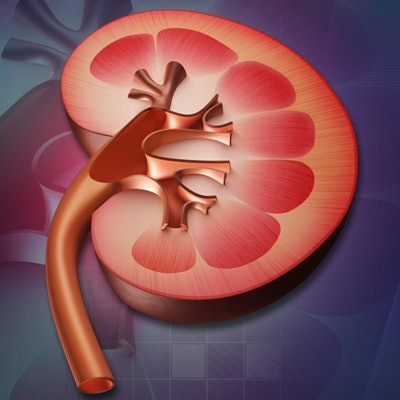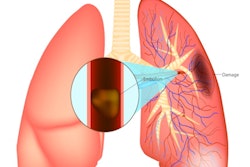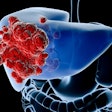
Exposure to intravenous contrast via CT pulmonary angiogram (CTPA) exams does not appear to cause long-term kidney injury, according to a study published April 5 in JAMA Internal Medicine.
The findings should put concerns about possible negative effects of contrast on the kidneys to rest, wrote a team led by Dr. Robert Goulden of McGill University in Montreal, Quebec.
"To our knowledge, this study provides the strongest evidence to date that intravenous contrast is not associated with significant [kidney] injury, further challenging the considerable clinical preoccupation with the occurrence and prevention of contrast-induced nephropathy," the group wrote.
A reported harm of radiocontrast is acute kidney injury -- although "recent observational studies ... found no association between contrast exposure and adverse renal outcomes" -- suggesting that "although contrast-induced nephropathy may have existed with contrast agents used in the past, modern agents and doses do not appear to be harmful," Goulden and colleagues noted.
Existing evidence of contrast agents' effects on the kidneys may be limited by biases such as perception of the severity of a patient's kidney injury risk, according to the authors. Goulden's group sought to explore the effects of CTPA contrast on kidney health by evaluating 156,028 patients with suspected pulmonary embolism (PE) seen in an Alberta, Canada, emergency department (ED) between 2013 and 2018.
Patients received a D-dimer test and if their results were 500 ng/mL or above, they underwent CTPA. The researchers examined the patients' estimated glomerular filtration rate (eGFR) taken at six months after the original visit to the ED; among study participants, the mean baseline eGFR was 86 mL/min/1.73 m2 (a normal eGFR measure is 60 mL/min/1.73 m2 or higher).
Of the total patient cohort, 84,624 patients had six-month follow-up eGFR data available. In this subgroup, the Goulden's team found no significant association of contrast at CTPA with increased eGFR (measured by mL/min/1.73 m2) and no significant evidence of association between CTPA and kidney replacement therapy, acute kidney injury, or all-cause mortality (measured by percentage). The group did find an association with harm between CTPA and eGFR change at six-month follow-up in patients with diabetes, but it was not statistically significant.
| Effect of CTPA exposure on kidney health at 6-month follow-up | |
| Outcome | eGFR, difference |
| Long-term eGFR | -0.4 mL/min/1.73 m2 |
| Kidney replacement | 0.07% |
| Acute kidney injury | 4.3% |
| All-cause mortality | 0.3% |
"Definitively proving a negative is difficult, but [our] results ... suggest that a clinically significant association of intravenous contrast with long-term renal function is very unlikely," the authors noted.
The study offers valuable perspective on contrast agents' effects on the kidneys, Dr. Vinay Guduguntla of the University of California, San Francisco and Dr. J. Michael McWilliams, PhD, of Harvard Medical School in Boston, wrote in an accompanying commentary.
"These findings add considerably to our understanding of the safety of newer contrast agents, which has otherwise been based on hard-to-interpret results from observational comparisons subject to selection bias," Guduguntla and McWilliams concluded.



















